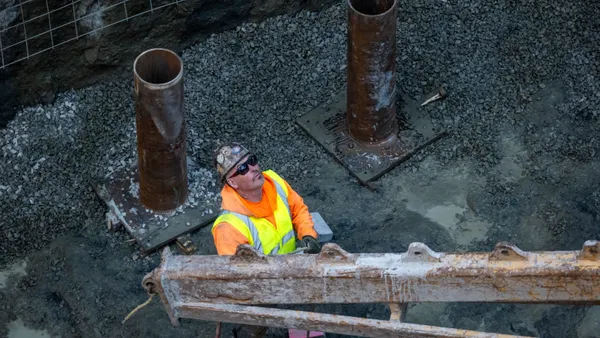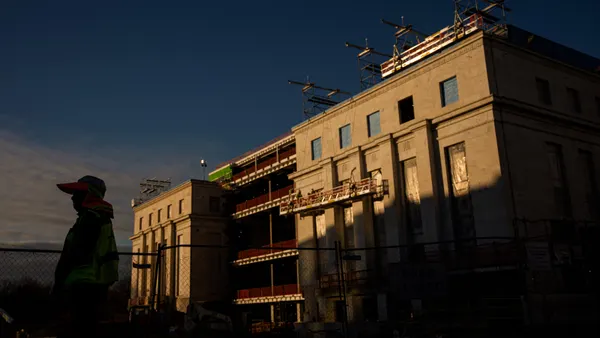Dive Brief:
- Federal Reserve officials announced Wednesday they unanimously voted to raise short-term interest rates 0.25 percentage points — the first increase since June 2006.
- Fed officials also signaled that they plan to further raise rates in 2016, but they will do so slowly, with rates likely increasing by just one percentage point over the next year. In their statement Wednesday, officials said the "gradual" manner of the estimated four increases in 2016 will result in a long-run target of 3.5% — a prediction unchanged from its September forecast.
- Recent gains in wages and job creation, along with the decline in the unemployment rate, have added more pressure to the Fed to raise interest rates after much anticipation.
Dive Insight:
In its 2016 Construction Outlook report, Dodge Data & Analytics noted that despite the impending Fed interest rate hike, long-term rate increases will likely remain on a gradual path. And with easing lending standards and an influx of funding support from state and local construction bond measures, Dodge predicted 2016 will be a year of slow but steady expansion for the overall construction industry.
"Even if interest rates go up, the money is still so cheap, you'll still see a lot of development," Jay Dacey, president of Massachusetts-based commercial and industrial firm Integrated Builders, told Construction Dive.
Homebuilders are keeping an especially close eye on interest rates, as some fear an increase would deter potential buyers from making the move from renting to owning — thus reducing the number of potential buyers for their new properties.
But officials and economists have said the slow rise in rates will not result in crippling effects for the housing market or for builders counting on a continued recovery in the residential industry.
The rise in short-term interest rates won't automatically affect mortgage rates, as the Fed doesn't control those increases. But a decision to raise the short-term Federal Funds Rate will almost certainly influence the investors who determine mortgage rates. That has been the case throughout history, as home loan rates have increased after the Fed's short-term rate hike decisions.
Jonathan Smoke, chief economist with Realtor.com, said in a statement, "We’re months if not years away from the type of high rates that would pose substantial risk to home sales, especially since what’s driving the gradual movement to higher rates is a much healthier economy producing consistent solid gains in employment and household formations."
In a Zillow report this week, 70% of potential buyers surveyed said they would not change their plans to buy a home, even if mortgage interest rates rise to 4.5% next year. Currently, 30-year fixed-rate mortgages are currently around 3.9%, according to USA Today.
However, Zillow also found that 45% of those surveyed would reconsider the size of the home they will purchase if such a rate increase occurs, possibly opting for a less expensive one.
Svenja Gudell, Zillow's chief economist, said in a statement, "Any immediate impact from a rate increase will be limited to key markets where housing is already expensive and affordability is already an issue, such as San Francisco, San Jose and LA. In the long term, further increases in interest rates may slow home price appreciation, although we expect any slowing to be nominal and gradual."













